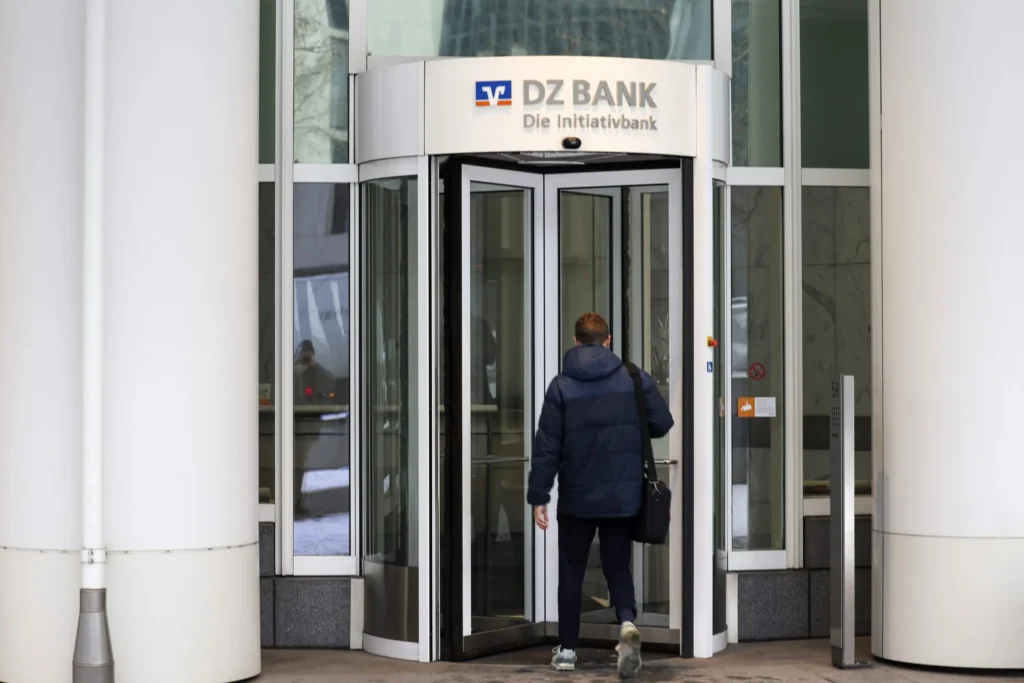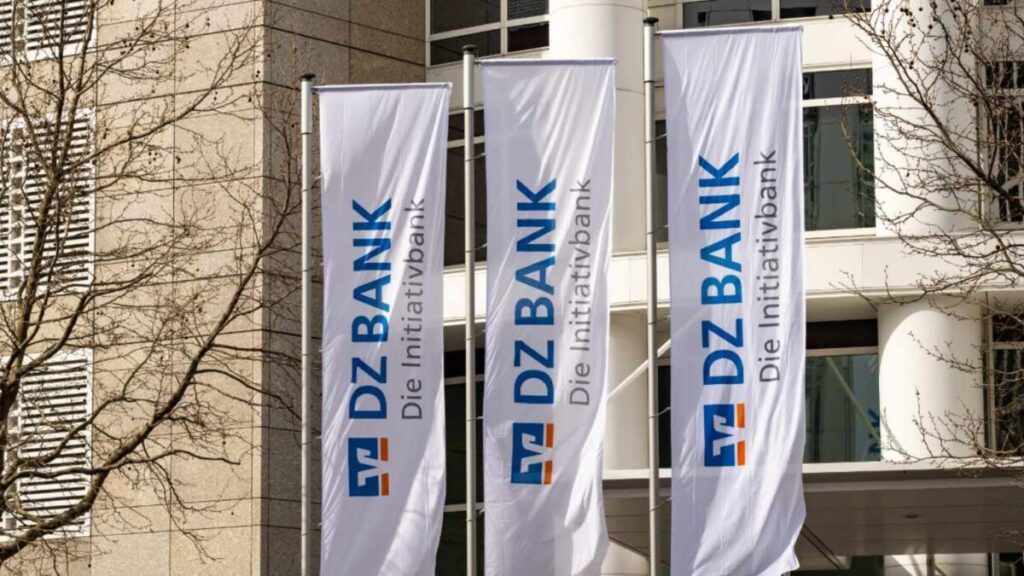In a significant step towards mainstream adoption of cryptocurrency, DZ Bank, Germany’s third-largest bank by asset size, has announced the launch of a digital asset custody platform built on blockchain technology. This move positions DZ Bank as a frontrunner in integrating traditional finance with the burgeoning world of digital assets.
Early in 2023, MicroStrategy’s Michael Saylor predicted that all big banks will one day custody Bitcoin (BTC). Indeed, despite the setbacks suffered by the cryptocurrency industry throughout the year, major banks have been reaching important milestones with Germany in many cases leading the way.
DZ Bank – Germany’s third largest – recently announced that it had launched its very own blockchain technology-based ‘digital financial instruments’ custody platform designed to cater to institutional customers.
The bank has a relatively long history with cryptocurrencies and has already been involved in Bankhaus Metzler’s first external transfer of crypto fund shares as a custodian and processor.
The increased interest of German banks in the cryptocurrency market is further exemplified by the fact that, in addition to DZ Bank, the $1.4 trillion banking giant – Deutsche Bank – also filed for the crypto custody license with BaFin in June 2023.
On November 2, DZ Bank, the third-largest bank in Germany, announced the launch of a digital assets custody platform for processing and safeguarding digital financial instruments on the blockchain. The bank has partnered with Swiss firm Metaco to manage its crypto services using Metaco’s custody technology platform, Harmonize.The venture makes DZ Bank one of the first credit institutions to launch an offer for institutional customers based on blockchain technology. To implement the new custody solution, the bank has hired over a dozen employees across IT, operations, and compliance.The digital custody platform, whose development began in 2022, will initially take crypto securities into custody, one of which is a crypto bond from Siemens.
DZ Bank and Union Investment subscribed to these bonds six months ago, and they can now be transferred to self-custody.DZ Bank had previously been a processor and custodian in the first external transaction of crypto fund shares from Bankhaus Metzler. Since both cases fall within the scope of the Electronic Securities Act (eWpG), it means custody is possible with the existing licences.Additionally, DZ Bank’s existing infrastructure makes them well-positioned to actively participate in the European Central Bank’s (ECB) exploration phase.
During this phase, the settlement of large-volume capital market transactions in central bank money is tested.Commenting on the venture, Dr Holger Meffert, Head of Securities Services & Digital Custody at DZ Bank, said, “We assume that within the next ten years, a significant proportion of capital market business will be processed via distributed ledger technology (DLT)-based infrastructures. In the medium term, we see DLT as a complementary technology to the established infrastructures in the existing capital market processes.”
Table of Contents
History of DZ Bank

A Legacy of Cooperation: Unveiling the History of DZ Bank
DZ Bank, Germany’s third-largest financial institution, boasts a rich history deeply rooted in the cooperative movement. Its journey began in the mid-19th century, fueled by the vision of empowering communities through mutual support. Let’s delve into the key milestones that shaped DZ Bank into the leading financial powerhouse it is today:
The Seeds of Cooperation: 1883 and Beyond
The roots of DZ Bank can be traced back to 1883 with the establishment of the Landwirtschaftliche Genossenschaftsbank AG in Darmstadt. This bank, formed by the collective effort of savings and loan banks in the state of Hesse, aimed to strengthen the cooperative financial system in the region. Its creation reflected the growing philosophy of Friedrich Wilhelm Raiffeisen, a pivotal figure in the German cooperative movement. Raiffeisen believed in the power of collaboration and self-help, advocating for financial institutions owned and operated by their members.
A Turning Point: The Birth of Deutsche Genossenschaftskasse (DG Bank)
Nearly two decades later, in 1902, the Reichsgenossenschaftsbank GmbH was established, also in Darmstadt. Notably, this institution deliberately chose not to cooperate with Raiffeisen’s central bank, the Landwirtschaftliche Zentral-Darlehnskasse. However, the cooperative movement continued to gain momentum, leading to a period of consolidation during the 20th century. Many local cooperative banks merged, and regional central institutes followed suit, reducing competition within the cooperative system.
A Legislative Leap: The DG BANK Deutsche Genossenschaftsbank Act
A significant turning point arrived in 1975 with the DG BANK Deutsche Genossenschaftsbank Act. This act not only renamed the Deutsche Genossenschaftskasse but also significantly expanded its operating scope. DG Bank was now authorized to operate branches both within Germany and abroad. This legislative change marked a pivotal moment, paving the way for a more expansive and internationally recognized institution.
The Dawn of a New Era: The Formation of DZ Bank AG
The groundwork laid by the DG Bank Act culminated in the formation of DZ Bank AG Deutsche Zentral-Genossenschaftsbank, Frankfurt am Main, in 1994. This marked the official birth of the institution we recognize today. Notably, Frankfurt am Main had already been earmarked as the location for the joint central bank in the early 1970s, foreshadowing the eventual consolidation.
Merger and Growth: The 21st Century and Beyond
DZ Bank continued to grow and evolve in the 21st century. In 2016, it merged with WGZ Bank, the central institute of cooperative banks in the Rhineland and Westphalia regions. This merger cemented DZ Bank’s position as a leading financial powerhouse in Germany.
A Legacy of Cooperation and Innovation
Today, DZ Bank stands as a testament to the enduring power of the cooperative movement. It serves over 8,900 cooperative banks, catering to both private and corporate clients. Beyond its core banking activities, DZ Bank actively promotes social responsibility and cultural initiatives, reflecting its commitment to the communities it serves.
Looking Ahead: Embracing the Future
As the financial landscape continues to evolve, DZ Bank remains at the forefront, embracing innovative technologies and adapting to the changing needs of its members and clients. Its recent foray into the crypto custody space with a blockchain-based platform exemplifies this commitment to innovation. As DZ Bank navigates the future, its rich history of cooperation, collaboration, and community focus will undoubtedly continue to guide its path forward.
DZ Bank model
DZ Bank, Germany’s third-largest financial institution, operates under a unique cooperative banking model. This model stands in contrast to traditional shareholder-owned banks and prioritizes serving the needs of its member institutions rather than maximizing profits for external investors. Here’s a breakdown of the key characteristics of the DZ Bank model:
Central Institution for Cooperative Banks:
- Structure: DZ Bank acts as the central institution for a vast network of over 8,900 cooperative banks across Germany. These member banks, known as Volksbanken and Raiffeisenbanken, form the backbone of the cooperative financial system.
- Focus on Member Support: DZ Bank provides a comprehensive range of financial services and products to its member banks. This includes liquidity management, lending, payment processing, and access to international financial markets. By supporting its members, DZ Bank empowers them to better serve their individual and business clients.
- Democratic Governance: The cooperative model emphasizes democratic principles. Each member bank holds ownership in DZ Bank, and representatives from these banks participate in the decision-making process through an elected board of directors. This ensures that the bank’s activities are aligned with the needs and interests of its member institutions.
Beyond Central Banking: A Diversified Portfolio
While serving as the central institution for cooperative banks is a core function, DZ Bank also operates a diversified business model:
- Retail Banking: DZ Bank offers a limited range of retail banking services directly to consumers through its branch network. However, the primary focus remains on providing financial products and services to its member banks, who then offer them to their individual clients.
- Corporate Banking: DZ Bank plays a significant role in corporate banking, catering to the needs of companies and institutions of all sizes. This includes providing lending solutions, investment banking services, and treasury management services.
- Subsidiaries and Specialized Entities: DZ Bank Group encompasses a wide range of subsidiaries and specialized entities that cater to specific financial needs. These include Bausparkasse Schwäbisch Hall (a building society), DZ HYP (a provider of commercial real estate finance), and Union Investment Group (an asset management company).
Financial Strength and Stability:
- Capital Structure: The cooperative model emphasizes maintaining a strong capital base. Profits are not distributed to external shareholders but rather retained to ensure the financial health and stability of the bank. This allows DZ Bank to weather economic downturns and invest in future growth initiatives.
- Long-Term Perspective: The cooperative model fosters a long-term perspective. DZ Bank is not beholden to the short-term demands of external shareholders but can focus on supporting its members and promoting sustainable growth within the cooperative financial system.
Challenges and Considerations:
- Innovation: While the cooperative model fosters stability, it can sometimes be slower to adapt to innovation compared to some shareholder-owned banks facing pressure to maximize returns. DZ Bank must ensure it embraces technological advancements while maintaining its core cooperative principles.
- Competition: The German financial landscape is becoming increasingly competitive. DZ Bank needs to find ways to differentiate itself from traditional banks and new fintech players to maintain its market share and attract new members.
Know more: https://www.dzbank.com/
DZ Bank believes DLT will become industry standard within a decade
Dr. Holger Meffert, the head of securities services and digital custody at DZ Bank, also expressed his conviction that the majority of capital market activity will be conducted using distributed ledger technology (DLT) within the next decade. DTL is often implemented using blockchains:
We assume that within the next ten years a significant proportion of capital market business will be processed via distributed ledger technology (DLT)-based infrastructures. In the medium term, we see DLT as a complementary technology to the established infrastructures in the existing capital market processes.
In its press release, DZ Bank also highlighted that its already-existing infrastructure is enabling it to be an active participant in the European Central Bank’s (ECB) exploration phase for the digital euro.

DZ Bank working to bring crypto custody to private customers
In its press release, DZ Bank also revealed it is actively working toward bringing cryptocurrency custody and trading services to its private customers. It announced it had hired ‘more than a dozen employees’ to fill the roles in compliance, IT, and operations to this end – as well as for the already-launched institutional custody platform.
Already in March 2023, Finbold reported that DZ Bank is actively working to bring a Bitcoin option to its customers before the end of this year. The news accompanied the announcement of the launch of Deutsche WertpapierService Bank AG’s (dwpbank) wpNex platform.
The platform’s introduction enabled more than 1,200 affiliated banks to offer Bitcoin trading and investing to their retail customers. At the time, the launch was lauded as the key step in Germany’s effort to become a major cryptocurrency hub.
Germany Embraces Crypto: DZ Bank Launches Blockchain-Based Custody Platform, Marking a Watershed Moment
The winds of change are blowing through the German financial landscape. DZ Bank, the nation’s third-largest financial institution by asset size, has made a bold move by launching a dedicated crypto custody platform built on blockchain technology. This groundbreaking initiative signifies a significant shift in Germany’s stance on cryptocurrency, paving the way for wider institutional adoption and potentially accelerating mainstream acceptance of digital assets.
A Cautious Nation Warms Up to Crypto
Germany, known for its meticulous regulatory approach towards financial matters, has historically adopted a cautious stance towards cryptocurrency. This stemmed from concerns about market volatility, security risks, and potential for money laundering activities. However, recent developments suggest a softening of this position. In March 2023, Deutsche WertpapierServiceBank, a central securities depository, launched its wpNex platform, facilitating crypto trading for institutional investors. DZ Bank’s entrance into the crypto custody space further underscores this shift, potentially marking a watershed moment for crypto adoption in Germany.

DZ Bank’s Platform: Security and Trust for Institutional Investors
DZ Bank’s platform isn’t designed for retail investors; its focus lies squarely on institutional players. This targeted approach aims to address the specific needs and concerns of institutional investors venturing into the crypto space. Here’s a closer look at what the platform offers:
- Unwavering Security with Blockchain Technology: Leveraging the inherent security and transparency of blockchain technology, DZ Bank’s platform provides a secure environment for storing and managing digital assets like Bitcoin. This addresses a critical concern for institutional investors who require robust safeguards against hacking and other security threats.
- Compliance at the Forefront: DZ Bank prioritizes adherence to regulatory frameworks and compliance with Know Your Customer (KYC) and Anti-Money Laundering (AML) standards. This ensures a legal and secure environment for institutional investors, fostering trust and mitigating potential financial crime risks associated with cryptocurrency.
- Seamless Integration with Existing Systems: Understanding the importance of workflow efficiency, DZ Bank has designed its platform to seamlessly integrate with existing institutional investment systems. This allows investors familiar with traditional financial instruments to navigate the crypto space with relative ease, minimizing disruptions to their established procedures.
Beyond Custody: A Glimpse into the Future of Crypto at DZ Bank
DZ Bank’s ambitions stretch beyond secure crypto custody. Here’s what the future might hold:
- Cryptocurrency Trading on the Horizon: In June 2023, DZ Bank reportedly applied for a crypto custody license. This suggests a potential future move towards offering cryptocurrency trading services directly to its institutional clients. This would create a one-stop shop for institutional investors seeking secure storage and trading capabilities for their crypto holdings.
- Expanding the Investment Menu: The platform might broaden its scope to include other digital assets beyond established cryptocurrencies like Bitcoin. This could cater to a wider range of institutional investment strategies and risk appetites, fostering a more diverse and dynamic crypto investment landscape.
- Bridging the Traditional and Crypto Divide: DZ Bank’s platform has the potential to act as a critical bridge between traditional finance and the crypto ecosystem. By providing a secure and regulated environment, it can encourage wider institutional participation in the crypto market, ultimately legitimizing digital assets and fostering greater mainstream acceptance.
Challenges and Considerations: Navigating the Crypto Frontier
Despite the optimistic outlook, challenges remain:
- The Regulatory Landscape: The regulatory landscape surrounding cryptocurrency is still evolving. Clear and consistent regulations from German and international authorities will be crucial for fostering widespread adoption by institutional investors and ensuring a stable and secure operating environment.
- Security Imperative: The crypto world has witnessed its fair share of hacks and scams. DZ Bank will need to continuously invest in and enhance its security measures to maintain investor trust. This may involve employing cutting-edge security protocols, conducting regular penetration testing, and implementing robust risk management practices.
- Market Volatility: While Bitcoin and other established cryptocurrencies have shown some stability, the market remains inherently volatile. DZ Bank will need to effectively manage these risks when advising clients and develop appropriate investment strategies that consider the inherent volatility of digital assets.
A Catalyst for Change: The Road Ahead for German Crypto
DZ Bank’s launch of a crypto custody platform signifies a pivotal moment for both the German financial sector and the global crypto market. While challenges remain, this move has the potential to be a catalyst for change. It paves the way for greater institutional involvement in the German crypto space, potentially leading to increased liquidity, market stability, and ultimately, wider mainstream adoption of digital assets. As regulations evolve, technology advances, and security measures become more sophisticated, we can expect to see a more integrated financial landscape in Germany and across the globe, where traditional finance and cryptocurrencies coexist and collaborate to create a more dynamic and inclusive financial ecosystem.
Disclaimer ||
The Information provided on this website article does not constitute investment advice ,financial advice,trading advice,or any other sort of advice and you should not treat any of the website’s content as such.
Always do your own research! DYOR NFA
Coin Data Cap does not recommend that any cryptocurrency should be bought, sold or held by you, Do Conduct your own due diligence and consult your financial adviser before making any investment decisions!





Leave feedback about this